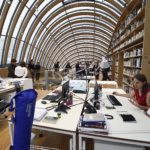Before Natan William Schultz Gomes came to Colorado, he had already developed a love for physics in high school. He even voluntarily taught physics in a prep course for high schoolers in his final year in his home country, Brazil, before pursuing programmes in education and energy engineering.
“I fell in love with the education and communication of physics,” says Gomes. “Since I was already living in Colorado, I needed to continue my education, and I knew I wanted to study physics.”

Learning assistants are students assigned to support their peers in learning, engagement and collaboration. Some even end up as friends outside the classroom, according to Gomes. Source: University of Colorado Denver
His enthusiasm brought him to the Department of Physics at the University of Colorado Denver (CU Denver). Immediately, he noticed there was something special about it – here, it was all about building knowledge together, working collaboratively, and being less competitive. Compared to Brazil, there were also more homework, reports, and weekly assignments, but with the help of a weekly planner and a whiteboard in his living room, Gomes produces consistent, excellent work.
“This programme also supports student research, and that has been challenging in both time management and setbacks in the research steps,” he adds. “Overcoming them requires resilience, but it’s so rewarding to see the progress in your research.”
Such outcomes are common in a highly respected comprehensive R1 research university. The university is a proud leader in research activity, advancing solutions and navigating critical global issues. The Department of Physics in particular is a champion in that aspect – faculty members are committed to providing substantive applied research experiences for all its students, blending lecture courses and laboratory work to offer a cutting-edge education.
That’s not all the unique experiences the department has to offer. The CU Denver physics department doesn’t have graduate programs in physics so undergraduate physics majors have opportunities to carry out extensive research without competing with graduate students. Undergraduate physics majors even teach classes like introductory experimental physics laboratory courses. Of course, they do not have to do it all alone; all undergraduate students work elbow-to-elbow with faculty members and learning assistants for their teaching and research.
“It’s interesting that the department contributes to world-leading research, but also cares enough about its undergraduate students to employ research-backed teaching methods and allow them to teach,” says Kathryn Hamilton, an assistant professor of the department who hails from Northern Ireland. “It’s fantastic that the department offers these opportunities, and it’s not something that every undergraduate student can get at many US institutions.”
No matter which area of physics you choose to specialise in, all prepare you for careers in industry. Gomes claims that he gained a great theoretical foundation, alongside a strong sense of collaborative work, scientific exploration, and hands-on skills.
“These make me a confident lab instructor and partner,” he says. “I can step into either a lab or research team and help with student engagement and feel confident about using equipment, collaborating, and learning the ropes as I go.”

Gebremariam appreciates that the department provides opportunities to ask questions, more office hours, and a very interactive learning environment. Source: University of Colorado Denver
Another highlight of the university is the Research and Creative Activities Symposium (RaCAS), an annual celebration of student research and creative scholarship. Students are encouraged to present their projects to their peers, professors, family, and friends. Gomes calls it one of the best academic events he’s ever been.
Many other students share his sentiments. Abigail Gebremariam, an undergraduate student pursuing Electrical Engineering and Physics, enjoyed participating in the 2024 RaCAS. She presented her research titled “The Electron Olympics: How high can we make Electrons jump?”, a poster that discussed the concept behind atomic structures, atomic collisions and their effects.
“We had students and professors from different departments come around and tour our posters, and being in a room with all these research enthusiasts felt great,” she says. “My favourite part was talking with parents of the presenters there; it felt great to hear recommendations and encouragement, especially as a student thousands of miles away from my own parents.”
An interdisciplinary quantum physics course
CU Denver’s Quantum Information Technology Certificate aims to prepare students to enter into a variety of areas in the quantum workforce. Its quantum teaching laboratory provides students with an opportunity to work with a 4k cryostat and make quantum measurements.
“Quantum computing draws on a lot of different areas, like math, physics, and electrical engineering,” explains Hamilton. “There are two quantum computing lecture courses and two quantum technology lab courses, and while they are designed to teach you the fundamentals of quantum computing and their associated technology, they also provide specific, tailor-made modules that will allow you to learn all the correct terminology and background information for a wide range of quantum industries.”
The certificate consists of four courses: Quantum Computing, Quantum Computing Algorithms, Quantum Computing Technology, and Quantum Technology Systems. It’s a multidisciplinary collaboration between the university’s electrical engineering and physics departments that positions students to excel in this transformational field.
The setting makes it all the better. According to Michael “Bodhi” Rogers, professor and chair of the Department of Physics, STEM careers are predicted to increase by 30% across Denver. “Denver is a hot spot right now for technology, so positioning our students in that way is critical,” he says. “We also hope people already in the industry will be attracted to the programme and take the courses.”
Outcomes speak for themselves. Thanks to a strong undergraduate experience, many students naturally find their calling through a range of STEM jobs; think vast career fields such as computer analysts, engineers, technical writers, doctors, and more. Graduate school is also a popular choice with several physics graduates this year aiming to earn a PhD.
Follow the University of Colorado Denver on Facebook, X, YouTube, Instagram, and LinkedIn.










